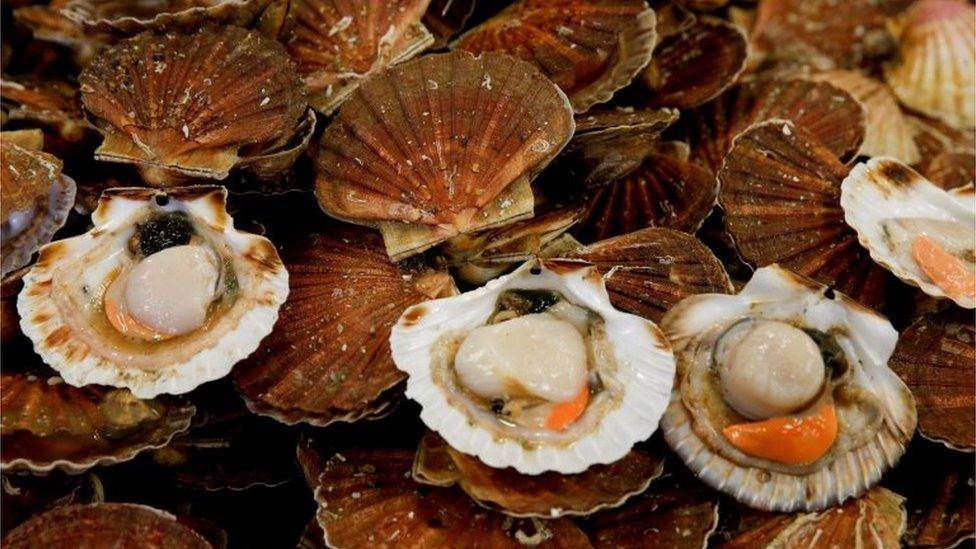Bottom trawling ban for key UK fishing sites
- Published

Scallops are among the species that will be affected
Two of the UK’s most sensitive fishing sites are set to receive better protection.
The Marine Management Organisation says it plans to safeguard fishing areas in Dogger Bank and South Dorset by completely banning bottom trawling.
The sites are already designated as protected areas, but in reality they are not patrolled - and they’re both over-fished.
Greenpeace recently dropped concrete blocks on to Dogger Bank.
The intention was to deter bottom trawling. Another group, Blue Marine, took legal action to try to safeguard the sea bed.
Bottom trawling is a destructive type of fishing which involves dragging weighted nets across the sea floor.
The MMO is consulting on proposed by-laws prohibiting bottom-towed gear on the sites. The consultation runs to 28 March 2021.
The Environment Secretary George Eustice said: “Now that we have left the Common Fisheries Policy, we are able to deliver on our commitment to achieve a healthy, thriving and sustainable marine environment.”
The decision couldn’t have been made if the UK was still in the EU, and it was condemned by the National Federation of Fishermen's Organisations (NFFO).
A spokesperson for the NFFO said: “The decision has been taken with zero discussion with those affected. There will be knock on environmental as well as social and economic impacts.”
Dogger Bank is the largest sandbank in UK waters, and underpins the North Sea’s ecosystem.
It provides a vital habitat for a wide range of species which live on and within the seabed, including flatfish, starfish, sandeels, crabs, clams, worms, scallops and more.
'Vital' food source
These species in turn provide a vital food source for predators such as porpoises, dolphins and seabirds.
Bottom trawlers typically seek scallops, sandeels, sole, plaice, cod, and crab.
The UK government has also proposed to partially stop bottom trawling at two other theoretically protected sites – one off the coast of Land’s End and the other off Lincolnshire.
Charles Clover from Blue Marine said: “We applaud this first step towards protecting our offshore marine protected areas, starting with the Dogger Bank, a huge and ecologically important area which has been hammered by trawls and dredges for too long.
“The government in England has conceded that damaging fishing has been going on illegally in protected areas.”
Mr Clover believes today’s announcement sets a precedent for all the UK's 73 offshore Marine Protected Areas for the devolved administrations and for the EU, which have the same law.
The NFFO described the proposals as having delivered “a sledgehammer to fishing”. It continued: “This punishing reversal comes on the back of the government’s failure to deliver on fishing in the Brexit negotiations, and damaging delays in the export of fish and shellfish.

Mr Eustice said he wanted a "sustainable marine environment"
But academics say fisheries have been taking too much. Prof Callum Roberts of Exeter University said: “What is left on the Dogger Bank today is a ghost of what was once there.
“New protection could lead to the beginnings of a recovery of a megafauna that used to thrive on the bank in astonishing densities: halibut, flapper skate, blue skate, longnose skate, angel sharks, turbot, brill, wolffish, conger eels, cod.
“Many of these species have declined so far that they are on the endangered species list. But, so far, marine conservation efforts in the UK have completely neglected doing anything to bring about their recovery.
“In the 1830s, small sailing vessels con the Dogger could catch a tonne of halibut per day. Today, the entire fishing fleet catches less than two tonnes a year.”
Chris Thorne, from Greenpeace UK, said: “All of our sensitive marine areas must be properly protected, not just four. Ministers have finally woken up to their responsibilities, yet there are still hundreds of other equally important marine areas still open to all forms of destructive industrial fishing.
"Action in these four sites is only the tip of the iceberg in terms of the scale needed to solve the crisis facing our oceans.
“This process shows that the government is prepared to use its new Brexit powers to properly protect our seas.”
Follow Roger on Twitter., external